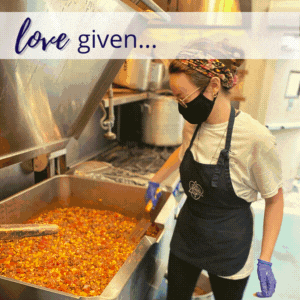By Maureen Paley, serving with Mercy Volunteer Corps in Sacramento, CA
“Maureen, what living in community does,” she paused—a note of gentle, knowing laughter in her voice—“is unearth all of your personal demons.”
I was sitting in McKinley Park in Sacramento, about a mile from the house I share with three community mates and fellow volunteers, all 12 years younger than me, having an early morning call with my spiritual director. It was a sunny morning in mid-October, and I had been holding a dark, dense heaviness in my chest and stomach since arriving in Sacramento in August. I was transitioning from two years of living alone in the Bay Area to living with new roommates in a new city, at a new job, and with an entirely new lifestyle and life focus.
| MVC member Maureen Paley harvests fruit from an orange tree at her service site in Sacramento, CA |
I was hurting. It wasn’t physical pain, but it may as well have been. Deep inside, right in the center of my discomfort, my intuition was telling me exactly what I didn’t want to hear: I needed to change.
“Yep, it does,” I responded. The tears that had been brimming in my eyelids finally fell down my cheeks.
My spiritual director, a Sister of Mercy, was helping me take an honest look at the work I needed to do, the way she has done for years. She told me that living in community is, indeed, hard, and she suggested it may be an opportunity to learn everything I could about myself and the human condition.
After I hung up, I watched the wind ripple through the park’s palm trees. Fortunately, I didn’t have any doubts about the decision to commit to a year of service. I felt I was exactly where I should be and somehow everything would work out. I held onto this conviction as I got on my bike and rode home.
As I opened the backyard gate, a familiar commentary started churning in my head—the incessant itemizing of all the things my roommates were doing wrong mixed with the rehearsing of everything I wanted to get off my chest in our next community meeting.
I took a breath and asked myself: Is this what you want to give to community? This?
The commentary twisted community life into “me” versus “them” and kept my community mates at a safe distance. I realized that I didn’t want to get to the end of the year and say: You didn’t even try. I didn’t want to keep my heart locked up. But I had no idea how to will my heart to open.
My service site is a permanent supportive housing community. Many residents manage mental illness and/or a history of drug and alcohol addiction, and many are in recovery. I am a Personal Development Coach there, supporting the residents’ wellness and independence. In working with people in recovery, a funny thing happens—they keep you honest. They talk about taking inventory, letting go of resentments, and making amends. And, in hearing their stories, I started taking an honest look at my story—how I put my will before God’s, how I hold on to resentments, how I fail to make amends.
A few weeks after the call with my spiritual director, one of the residents told me that she makes intentions every morning to keep herself on track in her recovery. She starts with: “I intend to remain teachable.” The next morning, I took out my journal and wrote: “I intend to remain teachable. I intend to learn everything I can about myself and others as I live in community.”
After a few weeks, I tiptoed a little deeper into this place of trust adding: “Dear Jesus, I intend to give your gifts of love, peace, compassion, mercy, and gentleness to myself, to my community mates, to my service site…” With a long history of having a tyrant for an inner critic, I knew I needed to give these gifts to myself first. Then, I might be able to offer them to others. So, I made intentions every morning. And slowly, quietly, something in me started to open up.
I found myself looking my community mates in the eye more, asking them how their days were, sharing more about myself. I’d sit down while they were watching a show on TV. I’d join them cooking in the kitchen. They made me laugh. Gradually, I cared about them. When it came to having those uncomfortable community conversations about mutual respect, chores, and finances, I took some risks. Though painfully uncomfortable at times, I communicated as honestly and gently as I could.
To my surprise, they seemed to listen. And, that gift was greater than whether or not they changed their behaviors or met my expectations. My taking the risk and their listening were enough.
Admittedly, it’s strange. I’m 34 years old, and living in intentional community with women who have just graduated from college allowed me the opportunity to have the first real, vulnerable conversations of my life.
A part of me was set free with each talk. I no longer needed to be in control. I no longer needed to be liked. I just needed to be honest—with myself and with them.
Doing this work in community has helped me help the residents at my service site—having difficult conversations with them, meeting them where they are, and coaching them on their paths. In this year of service, I’ve learned that community life, not to mention the overall service experience itself, is partly intentional but mostly mystery. God’s mystery. God takes over and does the work for you. I may never know how it happened—how the discomfort of community life unfolded into peace. I just know I am grateful for it.
“And the day came when the risk to remain tight in a bud was more painful than the risk it took to blossom.”
– Anaïs Nin


 Thousands of faith-based service opportunities can be at your fingertips with the RESPONSE. Download the latest edition today!
Thousands of faith-based service opportunities can be at your fingertips with the RESPONSE. Download the latest edition today!
